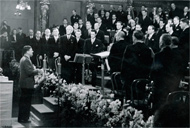
Yesterday I posted about how the film “The Sound of Music” gave a distorted image of Austrian complicity in Nazi policies, suggesting the Austrians were victims rather than enthusiastic participants. Apparently show music isn’t the only type of music that gives a distorted picture of Austria’s role in the war.
Today, to mark the 75th anniversary of the Anschluss, the full report on the Vienna Philharmonic’s Nazi involvement was published on the orchestra’s website. (I posted a picture of Vienna’s enthusiastic reception for the Anschluss yesterday, not aware — at least consciously — of this unhappy occasion. I’m posting another today, because you can never have too many.)

According to The Huffington Post:
A new report by the Vienna Philharmonic Orchestra reveals that almost half the orchestra’s members belonged to the Nazi Party by 1942. The orchestra’s study also says that it expelled over a dozen players because of their Jewish affiliations, and that some of them perished in concentration camps after their expulsion.
The article notes that the orchestra’s most famous concert was originally a propaganda tool:
Founded in 1842, the Vienna Philharmonic is perhaps best known for its annual New Year’s Concert, which is broadcast on Jan. 1 from Vienna to tens of millions of people around the world. The renowned concert was started in 1939 as a way to help spread Nazi propaganda, says one of the historians hired by the orchestra to investigate its past, according to Reuters.
Not until 1991 — more than four decades after the war ended — did Austria acknowledge its role in the war and express regret for it.
I read about the Vienna Philharmonic’s ugly past this weekend, but it was a news report on NPR this morning that reminded me of this unhappy anniversary. That same report noted that more than half the people surveyed today still see Austria as a victim of Nazi Germany.

William Shirer was in Vienna during the Anschluss and reported vividly the Austrian reaction in his book, This Is Berlin: Radio Reports from Nazi Germany. Viktor Frankl also had a powerful and very personal experience of this very thing on the eve of the Anschluss, recorded in my book. It is interesting how these events get rewritten. I have very deep connections in Denmark, which gets such wonderful press, and the resistance there did manage to get all Jews who believed they were in danger to safety in Sweden. The Danish Red Cross also was very proactive on behalf of Danish Jews in Theresienstadt. However, I’ve learned from a Danish friend who is a historian that the initial response to the Nazi occupation was, “Let’s just go along with this–” i.e., collaboration at the government level. Perhaps not the rejoicing that there was in Austria, but no real resistance in the beginning.
We discussed here yesterday how depressed I felt, writing about my mother’s past. I suppose there’s a limit to how much evil — or even complacency — people can bear hearing about. It makes life easier to believe that there are good countries filled with good people; traveling that other path leads to despair.
Thank you for sharing this information — and for starting this conversation.
That’s a good observation as to motivation for rewriting history–not only to whitewash, but wishing to believe in the good. I don’t know about good countries, but certainly good people everywhere. Frankl wrote: “From all this we may learn that there are two races of men in this world, but only these two–the ‘race’ of the decent man and the ‘race’ of the indecent man. Both are found everywhere; they penetrate into all groups of society. No group consists entirely of decent or indecent people. In this sense, no group is of ‘pure race’.”
It must have been difficult for you to read about Viktor Frankl’s past — and wonderful for you to have his wisdom about it to turn to. What an inspirational man to spend time with!
What I cannot fathom to this day is how a pure appreciation of music, art and nature does not a decent man make – what is missing?
I suppose as long as art is made by humans, there can be no purity. Nature is another thing. That’s probably why my mother brought an edelweiss with her from Austria.
Oh you’re right of course – Nature may be pure but humans are not – . I’m happy to hear about your mother and the edelweiss.
I’m told animals can do no evil, though I’m not sure all my pets got the message 🙂
I hear you on that one…
Goodness, I never knew this about the Vienna Philharmonic. I know what it means to expel members of an orchestra, since our daughter is 1st flute in the Fort Wayne Philharmonic in Indiana. I wonder what composers they played in their New Year’s concert, and how the music was chosen to support the Nazi cause!
Under tyranny, even the arts are usurped. How nauseating. We need to be much more attentive to history. Thanks for informing us.
Yes, it’s hard to imagine an arts organization behaving this way; you’d think they would be above the fray. I was also wondering what composers they played — maybe Wagner, and certainly not Mendhelsohn! How nice for you to have a daughter in the Fort Wayne Philharmonic.
Sad stories, but ones that need to be told.